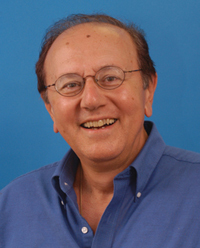
The National Science Foundation (NSF) has awarded a five-year, $5 million grant to a research project titled “Science of Integration for Cyber-Physical Systems,” in which Panos Antsaklis, H.C. and E.A. Brosey Professor of Engineering at the University of Notre Dame, is playing a key role.
The project is a joint effort of Notre Dame, Vanderbilt University, the University of Maryland and General Motors Research and Development Center. Vanderbilt will lead the project and Notre Dame will be in charge of its theoretical aspects, under a $1.5-million agreement. In addition to Antsaklis, Vijay Gupta from Notre Dame’s Department of Electrical Engineering and William Goodwine from its Department of Aerospace and Mechanical Engineering will participate in the research effort.
“This is a highly competitive and very prestigious NSF award,” Antsaklis said. “The project aims to develop the theory, methods and tools to build Cyber-Physical Systems (CPS), by combining seamlessly the necessary heterogeneous computational and physical components. The Notre Dame team will be using theoretical concepts such as passivity and symmetry to address system uncertainties and the interdependence of design concerns. The scientific results will be validated on a GM electrical vehicle automotive test-bed.”
Industry has long recognized the huge significance of systems integration and regarded it as a grand challenge. The NSF funded project is designed to solve this challenging problem.
“Cyber-physical systems are physical, biological and engineered systems whose operations are monitored, coordinated, controlled and integrated by a computing and communication core,” Antsaklis said. “As computers become ever-smaller, faster and more efficient, and communication networks become better and ever cheaper, computing and communication capabilities are being embedded in all types of objects and structures in the physical environment. This intimate coupling between the cyber and physical will be manifested from the nano-world to large scale, wide-area systems of systems, and at multiple time scales.”
Antsaklis points to several technological and economic drivers for the trend toward CPS systems, including the decreasing cost of computation, networking and sensing; a variety of social and economic forces which will require America to use national infrastructures more efficiently; and environmental pressures which mandate the rapid introduction of technologies to improve energy efficiency and reduce pollution. Also, as our national population ages, more efficient use of our health care systems, ranging from facilities to medical data and information, will have to occur.
“Applications with enormous societal impact and economic benefit will be created by the development of CPA systems,” Antsaklis said.
NSF began funding CPS research last year. According to the agency, research advances in cyber-physical systems promise to transform our world with systems that respond more quickly (autonomous collision avoidance), are more precise (robotic surgery and nano-tolerance manufacturing), that work in dangerous or inaccessible environments (autonomous systems for search and rescue, firefighting and exploration), are large-scale, distributed coordination (automobile traffic control), are highly efficient (zero-net energy buildings), and augment human capabilities and societal well being (assistive technologies and ubiquitous healthcare monitoring and delivery).
Notre Dame is poised to play a leading role in CPS research, having had a significant presence in the area since its inception through the leadership efforts of its Systems and Control faculty. Antsaklis was a member of the 2007 committee of the President’s Council of Advisors in Science and Technology that recognized the importance of CPS to society and made it the number one national priority in networking and information technology federal research funding.
“Cyber-physical systems will transform how we interact with the physical world, just as the Internet transformed how we interact with another,” Antsaklis said.
Contact: Panos Antsaklis, 574-631-5792, Antsaklis.1@nd.edu